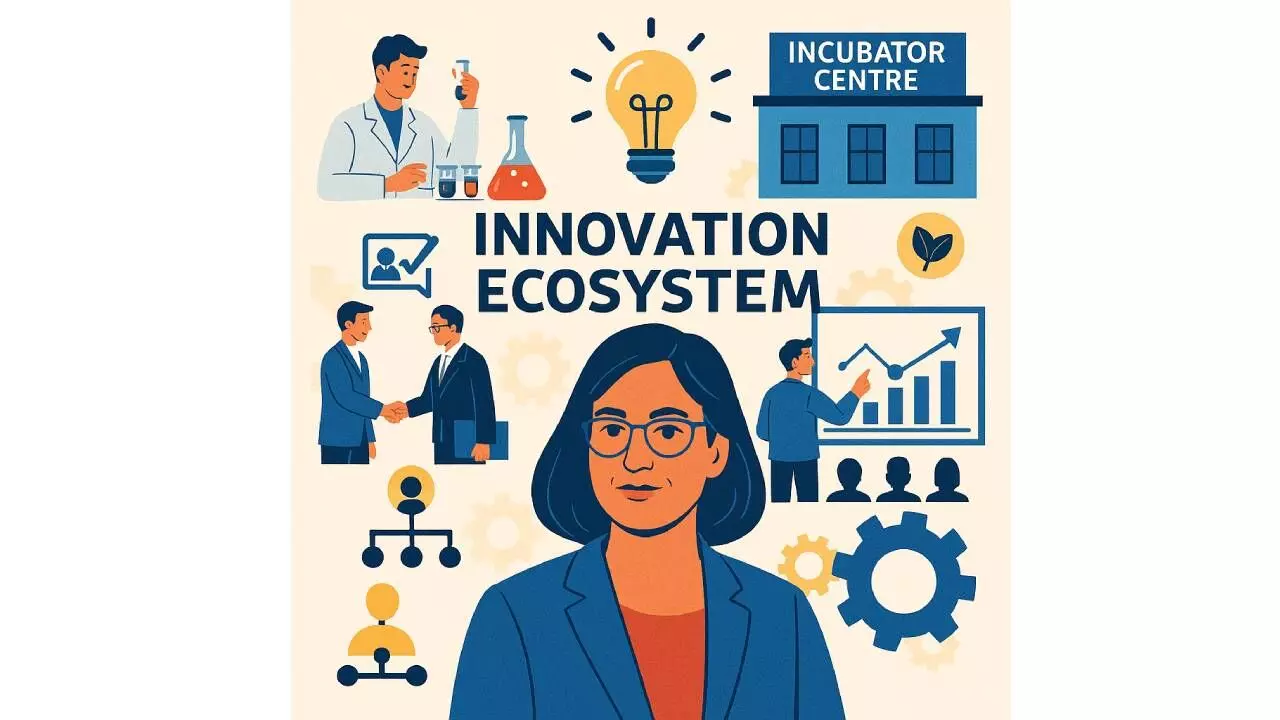IKP rethinks innovation playbook to build future-ready startups
Its chief Deepanwita Chattopadhyay calls for flexible, collaborative models as AI, climate shifts and global disruptions reshape how India must innovate and scale
image for illustrative purpose

Hyderabad: At the heart of Hyderabad’s innovation ecosystem stands IKP Knowledge Park — a pioneering institution that has powered the growth of hundreds of startups over the past two decades. Guiding this dynamic hub of science, technology, and enterprise is Deepanwita Chattopadhyay, Chairman and CEO of IKP, whose leadership continues to shape how innovation is nurtured and scaled in India.
Speaking to Bizz Buzz amidst the vibrant energy of scientists, entrepreneurs, and investors gathered at IKP under the theme “Beyond the Blueprint: Recalibrating Innovation for a Disrupted World,” Chattopadhyay reflected on how the pace of global change is compelling a fundamental rethink of traditional innovation models.
“The idea behind Beyond the Blueprint stems from recognising how rapidly the world around us is transforming,” she began. “For over twenty years, India’s science parks and incubators have built a strong foundation. But the same models may no longer suffice.”
She pointed to the seismic shifts driven by artificial intelligence, climate change, and geopolitical disruptions, all of which demand agility and reinvention. “If we continue relying on old methods, we risk falling behind,” she said.
“We must reimagine how startups are supported and how India positions itself within this evolving global order. Going beyond the blueprint means moving away from fixed systems to create flexible, future-ready frameworks.”
For Chattopadhyay, the notion of a ‘disrupted world’ captures the growing uncertainty affecting trade, supply chains, and technological sovereignty. “India cannot depend solely on imports or borrowed technologies,” she asserted. “We must create indigenous solutions that enable us to thrive despite global turbulence.”
This vision, she believes, can only succeed through collaboration across multiple layers of society. “Innovation isn’t the government’s responsibility alone. Entrepreneurs, researchers, investors, and citizens must all contribute. That is precisely what we are fostering at IKP.”
This year’s event featured around 150 startups, organized into five thematic clusters. Nearly 80 of these originated from Telangana, reflecting the state’s thriving innovation ecosystem. Through these clusters, IKP helps startups gain both local relevance and global visibility.
Among IKP’s success stories is Punishka, one of its earliest ventures, which now works closely with the Indian Army and Navy. “We helped them secure bank loans and scale up manufacturing,” she said with pride. Funding at IKP varies by stage — from Rs 10–30 lakh for early ventures to up to Rs 1 crore for advanced startups. “This year, we’ve already announced a Rs 1 crore investment for one selected company,” she added.
However, she stressed that funding is only one part of the equation. “Startups need the right ecosystem, supportive regulations, mentoring, and market access. That’s where we step in.”
Over 720 people registered for the event, which featured three thematic roundtables — One Health, Cell and Gene Therapy, and Smart Protein. These discussions explored sustainable proteins, advanced medical therapies, and the convergence of human, animal, and planetary health, even leading to the creation of a national One Health forum.
On the following day, IKP hosted a conference on the future of incubators, bringing together representatives from across India — from Hyderabad and Mumbai to Chennai and Goa — to discuss how incubation models must evolve amid constant disruption.
As we toured the exhibition area, Chattopadhyay paused at a Visakhapatnam-based startup that developed a method to extract 99% pure rare earth elements from recycled magnets — reducing India’s import dependency. Nearby, another showcased soft protective goggles for children with eye disorders, now under trials at Fernandez Hospital.
“These are small but powerful examples of how innovation transforms lives,” she said. “Our mission is to connect innovators with mentors, investors, and collaborators so their ideas can grow.”
As the day concluded, Chattopadhyay summed up her philosophy: “Innovation doesn’t happen in isolation. It thrives when people, ideas, and purpose come together.”
Through IKP Knowledge Park, she continues to cultivate precisely that ecosystem — where science meets society, and Indian ingenuity reshapes industries and communities alike.

